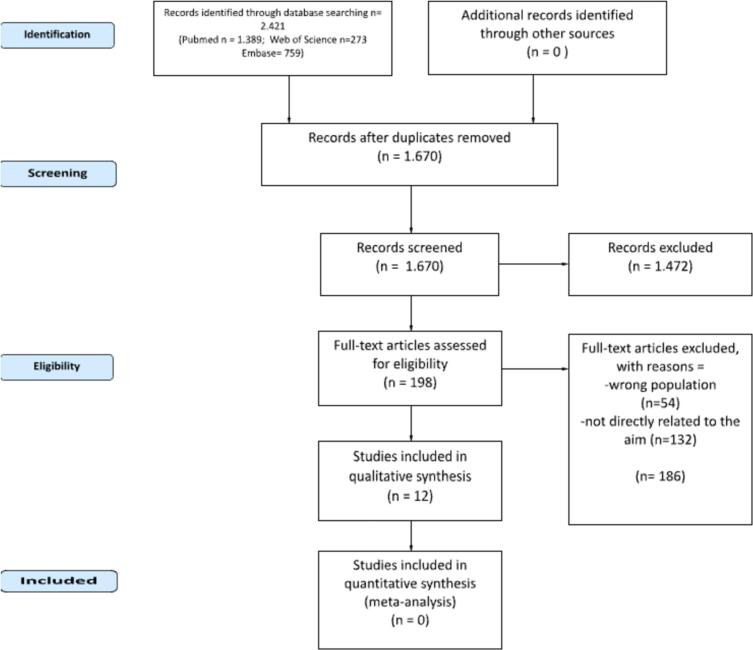COVID-19对痴呆患者功能、认知、神经精神和健康相关结局的影响:一项系统综述
Q3 Neuroscience
引用次数: 0
摘要
背景:本系统综述分析了COVID-19对痴呆患者功能、认知、神经精神和健康相关结局的影响。它假设,与未感染的痴呆症患者相比,感染sars - cov -2的痴呆症患者病情恶化更明显。方法:研究于2020年3月1日至2023年10月7日使用Medline、Web of Science和Embase数据库,遵循PRISMA指南和PICO框架。该研究旨在确定SARS-CoV-2感染是否与痴呆症患者的预后较差有关。该方案已在PROSPERO注册(CRD42022352481),并使用纽卡斯尔-渥太华量表评估偏倚。结果:在198项研究中,只有3项符合标准。Chen等人(2023)发现,sars - cov -2感染的痴呆患者死亡率更高,而Merla等人(2023)观察到,住院人数增加,感染者的认知能力下降速度更快。此外,Cascini等人(2022)报告了痴呆患者感染风险增加和死亡率显著升高,强调合并症和抗精神病药物使用是关键危险因素。结论:这些有限的数据表明,COVID-19后痴呆患者的死亡率和认知能力下降更高,强调了在这一领域进行广泛研究的必要性。本文章由计算机程序翻译,如有差异,请以英文原文为准。

Impact of COVID-19 on functional, cognitive, neuropsychiatric, and health-related outcomes in patients with dementia: A systematic review
Background
This systematic review analyzes the impact of COVID-19 on dementia patients' functional, cognitive, neuropsychiatric, and health related outcomes. It hypothesizes that dementia patients infected with SARS-CoV-2experience more pronounced deterioration compared to those who are uninfected.
Methods
Research from 01/03/2020 to 07/10/2023 was conducted using Medline, Web of Science, and Embase databases, and adhering to PRISMA guidelines and the PICO framework. The study aimed to determine if SARS-CoV-2 infection is associated with worse outcomes in dementia patients. The protocol is registered in PROSPERO (CRD42022352481), and bias was evaluated using the Newcastle-Ottawa Scale.
Results
Among 198 studies reviewed, only three met the criteria. Chen et al. (2023) identified higher mortality in SARS-CoV-2-infected dementia patients, while Merla et al. (2023) observed faster cognitive decline in infected individuals with increased hospital admissions. Additionally, Cascini et al. (2022) reported an increased risk of infection and significantly elevated mortality in dementia patients, highlighting comorbidities and antipsychotic medication use as key risk factors.
Conclusion
These limited data suggest higher mortality and cognitive decline in dementia patients following COVID-19, underscoring the need for extensive research in this area.
求助全文
通过发布文献求助,成功后即可免费获取论文全文。
去求助
来源期刊

eNeurologicalSci
Neuroscience-Neurology
CiteScore
3.50
自引率
0.00%
发文量
45
审稿时长
62 days
期刊介绍:
eNeurologicalSci provides a medium for the prompt publication of original articles in neurology and neuroscience from around the world. eNS places special emphasis on articles that: 1) provide guidance to clinicians around the world (Best Practices, Global Neurology); 2) report cutting-edge science related to neurology (Basic and Translational Sciences); 3) educate readers about relevant and practical clinical outcomes in neurology (Outcomes Research); and 4) summarize or editorialize the current state of the literature (Reviews, Commentaries, and Editorials). eNS accepts most types of manuscripts for consideration including original research papers, short communications, reviews, book reviews, letters to the Editor, opinions and editorials. Topics considered will be from neurology-related fields that are of interest to practicing physicians around the world. Examples include neuromuscular diseases, demyelination, atrophies, dementia, neoplasms, infections, epilepsies, disturbances of consciousness, stroke and cerebral circulation, growth and development, plasticity and intermediary metabolism. The fields covered may include neuroanatomy, neurochemistry, neuroendocrinology, neuroepidemiology, neurogenetics, neuroimmunology, neuroophthalmology, neuropathology, neuropharmacology, neurophysiology, neuropsychology, neuroradiology, neurosurgery, neurooncology, neurotoxicology, restorative neurology, and tropical neurology.
 求助内容:
求助内容: 应助结果提醒方式:
应助结果提醒方式:


